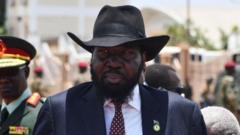South Sudan's foreign ministry has criticized the recent U.S. visa ban on its citizens, asserting it stemmed from an incident involving a national from the Democratic Republic of Congo.
South Sudan Denounces US Visa Ban as Misplaced Punishment

South Sudan Denounces US Visa Ban as Misplaced Punishment
The South Sudanese government claims the U.S. visa ban is grounded in a misidentification of nationality.
In an unprecedented move, South Sudan's government has voiced strong disapproval of the U.S. visa restrictions imposed on its nationals, stating that the revocation was due to a case of mistaken identity. U.S. Secretary of State Marco Rubio announced this visa ban following South Sudan's alleged refusal to accept the return of its citizens deported from the U.S. However, South Sudan’s authorities clarified that the individual at the center of the issue was not South Sudanese but a citizen of the Democratic Republic of Congo. This mischaracterization has led to a blanket ban affecting all South Sudanese passport holders.
Rubio justified the measures, citing South Sudan's transitional government’s failure to accept their repatriated citizens. He further noted that the U.S. would deny entry to any arriving South Sudanese nationals at its ports. In response, South Sudan's foreign ministry expressed deep regret over the sweeping nature of the visa restrictions, emphasizing that the evidence supporting their position had been shared with U.S. officials.
Adding to the complexity of the situation, tensions within South Sudan are escalating. Fears of renewed civil unrest have resurfaced with remarks from President Salva Kiir regarding First Vice-President Riek Machar’s alleged role in inciting a potential revolt. The U.S. has previously responded to rising insecurity by ordering the evacuation of non-emergency staff from South Sudan. In light of these developments, South Sudanese citizens in the U.S. face the impending expiration of their Temporary Protected Status (TPS), originally granted due to the country's unstable conditions.
This visa crisis highlights the fragile relationship between the U.S. and South Sudan, as escalating tensions may have lasting impacts on diplomatic ties.
Rubio justified the measures, citing South Sudan's transitional government’s failure to accept their repatriated citizens. He further noted that the U.S. would deny entry to any arriving South Sudanese nationals at its ports. In response, South Sudan's foreign ministry expressed deep regret over the sweeping nature of the visa restrictions, emphasizing that the evidence supporting their position had been shared with U.S. officials.
Adding to the complexity of the situation, tensions within South Sudan are escalating. Fears of renewed civil unrest have resurfaced with remarks from President Salva Kiir regarding First Vice-President Riek Machar’s alleged role in inciting a potential revolt. The U.S. has previously responded to rising insecurity by ordering the evacuation of non-emergency staff from South Sudan. In light of these developments, South Sudanese citizens in the U.S. face the impending expiration of their Temporary Protected Status (TPS), originally granted due to the country's unstable conditions.
This visa crisis highlights the fragile relationship between the U.S. and South Sudan, as escalating tensions may have lasting impacts on diplomatic ties.





















